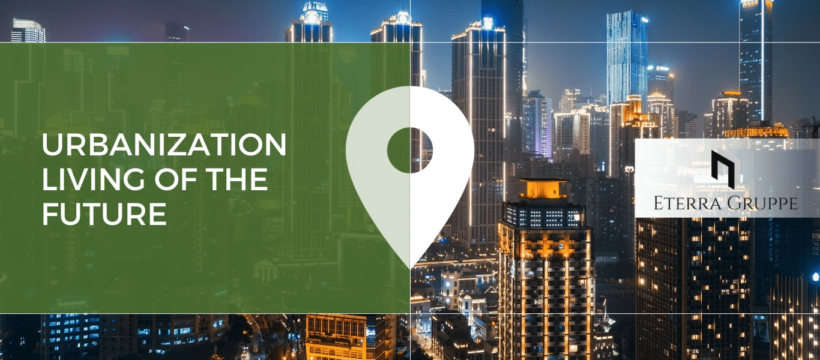The Future of Living: Vision for Discussion, by Sven Bading, Real Estate Expert of the Eterra Group.
A look into the history and present of the Eterra Group. The Eterra Group, a renowned German construction management and property development company based in Magdeburg, has made a name for itself through the combination of attractive architecture, high-quality environment design, and sustainability. Founded in 1979, the company underwent a significant transformation in 2018. The repositioning in 2019 focused on project development in the real estate sector, and the group expanded in 2020. In 2021, Matthias Claßen joined as the second managing director, accompanied by the relocation of the headquarters to Magdeburg. With current projects like Ostseebad Binz or Quartier Kalkberger Höfe, the Eterra Group demonstrates its innovative strength and clear position in the market.
The future of living is undergoing a fascinating transformation, shaped by the multifaceted influences of our time. Sven Bading, a renowned project developer and real estate expert of the Eterra Group, takes a profound look at the challenges and developments that will shape the housing sector in the coming decades.
Demographic Change: Flexibility for Various Life Phases
In a world where people live longer and go through different life phases, the flexibility of living space becomes a central factor. Singles, families, and seniors have individual needs that the architecture of the future must consider.
Digitalization: Networked Homes as the Key
The advancing digitalization is transforming not only the working world but also the way we live. Intelligent solutions, from smart home technologies to sustainable energy management, will become integral components of future living.
Affordable Housing: A Social Responsibility
The creation of affordable housing is a central societal challenge. In urban centers in particular, housing costs are rising, and innovative concepts are needed to make high-quality housing accessible to broad population segments.
Climate Change: Sustainability as a Guiding Principle
Climate change requires sustainable solutions in the construction industry. Sven Bading emphasizes the need for future-proof buildings to be sustainably designed in order to meet rising operating costs and political demands. The ecological transformation becomes the answer to global challenges.
Mobility: New Requirements for Location and Amenities
People’s mobility is changing, driven by flexible work models and a shift in commuting behavior. This leads to new requirements for the location and amenities of living space, further integrating residential and work areas.
The future of living reveals itself as a fascinating mosaic of social, technological, and ecological developments. Sven Bading and the Eterra Group serve as trailblazers for innovative solutions that not only address the challenges of our time but also shape the living of the future. The transformation is already in full swing, and it is up to us to embrace these developments as opportunities and collectively shape the future of living.
The Evolution of Living: From the Present to the Future
Experts like Sven Bading foresee a gradual evolution of living in the next decades. Contrary to some futuristic visions, we will probably not be living in space capsules or futuristic cities. Instead, the fusion of tradition and innovation will shape the architecture.
The Ecological Transformation as a Forward-Looking Trend
Bading predicts that ecological transformation will occupy a broad space. Persistent resource scarcity and rising operating costs make sustainable buildings economically attractive. The house of the future will become an energy supplier, with small wind turbines, photovoltaic systems, and geothermal probes providing heat, electricity, and cooling.
Adaptation to Extreme Weather Conditions and Resource-Efficient Construction
In view of climate change, buildings will be adapted to extreme weather conditions. In flood-prone areas, buildings will be elevated on stilts or have flood compartments in the basement. Furthermore, water scarcity will revolutionize the bathroom, with filtration technologies and multiple water reuse. Buildings themselves will be recyclable, modular, and environmentally friendly.
Continuity in Change: Architecture Remains, Technology Changes
Bading emphasizes that the external appearance of residential buildings will hardly change in the medium term. The hardware remains, but the software, especially, will change. Transaction costs in real estate purchases also play a role. Increasing mobility requires streamlined purchase and sale processes, while connected apartments with internet-enabled devices are already part of our vision of future living.
Conclusion: Shaping the Future of Living
The future of living is shaped by various influences. The construction and real estate industry face major challenges, which the responsible persons at the Eterra Group see as a catalyst for innovation and sustainable construction. From flexible lifestyle concepts to digital networking and ecological transformation, the future of living will be characterized by a harmonious symbiosis of tradition and innovation, the Eterra Group believes. In Magdeburg and beyond, they create not only buildings but living spaces for a diverse society.
Author: Daniel Slenters, Entrepreneur
Die Eterra Gruppe ist ein innovatives und zukunftsorientiertes Immobilienunternehmen aus Magdeburg, das sich für nachhaltiges Wohnen einsetzt. Das Unternehmen bietet ein breites Leistungsspektrum an und arbeitet eng mit seinen Kunden und Investoren zusammen, um individuellen Bedürfnisse zu erfüllen.
Kontakt
ETERRA Gruppe GmbH
Matthias Claßen
Halberstädter Straße 13
39112 Magdeburg
+49 (0) 391 6111 5868

https://www.eterragruppe.com
Die Bildrechte liegen bei dem Verfasser der Mitteilung.

